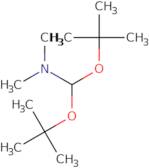N,N-Dimethylformamide di-tert-butyl acetal
CAS: 36805-97-7
Ref. 3D-FD33594
| 1g | Descontinuado | ||
| 2g | Descontinuado | ||
| 5g | Descontinuado | ||
| 10g | Descontinuado | ||
| 25g | Descontinuado |
Informação sobre produto
- 1,1-Di-tert-butoxytrimethylamine
- 1,1-Bis(1,1-dimethylethoxy)-N,N,N-trimethylamine
- 1,1-Bis(1,1-dimethylethoxy)-N,N-dimethylmethanamine
- 1,1-Di-tert-butoxy-N,N-dimethylmethaneamine
- 1,1-Di-tert-butoxy-N,N-dimethylmethylamine
- 1,1-di-tert-butoxy-N,N-dimethylmethanamine
- DMF di-tert-butyl acetal
- Di(tert-butoxy)(dimethylamino)methane
- Di-tert-butoxymethyl-dimethyl-amine
- Di-tert-butoxymethyldimethylamine
- Ver mais sinónimos
- Di-tert-butyl dimethylformamide acetal
- Dimethylformamide di-tert-butyl acetal
- Methanamine, 1,1-bis(1,1-dimethylethoxy)-N,N-dimethyl-
- N,N-DMF di-tert-butyl acetal
- Trimethylamine, 1,1-di-tert-butoxy-
- [Bis(tert-butoxy)methyl]dimethylamine
- di-tert-butoxy-N,N-dimethylmethanaminium
N,N-dimethylformamide di-tert-butyl acetal (DMF) is a heterocyclic amine that is used as a synthetic intermediate in the production of polyurethane elastomers. DMF has been shown to cause cancer in mice, but it is not known whether this effect is seen in humans. DMF also has an ability to bind to and activate nuclear receptors, which may be responsible for its proliferative effects on cells. This chemical can be metabolized by cytochrome P450 enzymes into different metabolites that have varying effects on cells. The major metabolites of DMF are N,N-dimethylformamide diacetal (DMFA) and N,N-dimethylformamide dimethoxyacetal (DMDMA). DMFA binds to and activates the peroxisome proliferator receptor and has been shown to inhibit the activation of estrogen receptors. DMDMA binds to and activates the retinoid X





